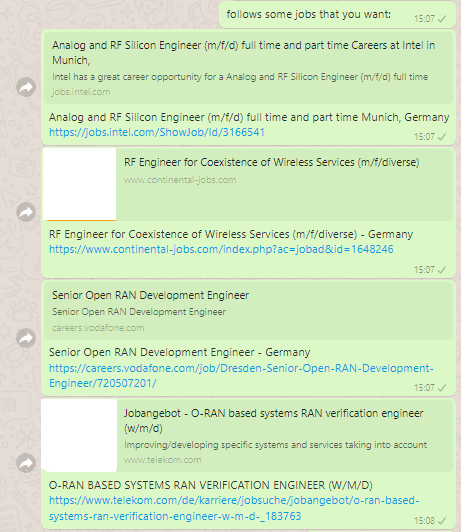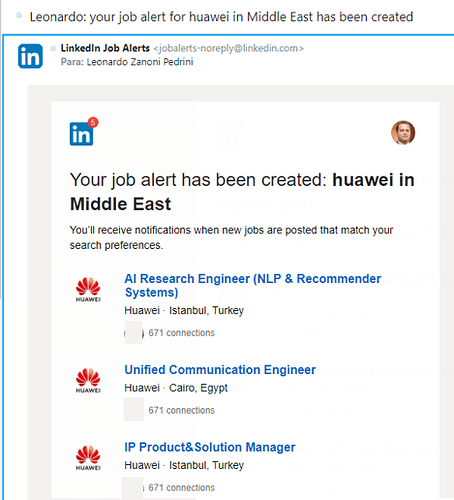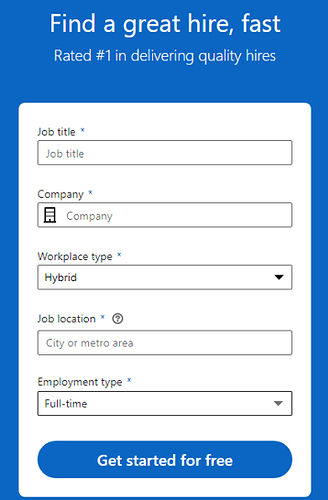Introduction
This article sould be already flagged as “Solved”. And then you can ask yourself: how can a topic like this (How to get a job) be marked as solved? ![]()

The answer is simple: because it really is! If you follow the tips I’ll show you here today, you’ll certainly agree.
So, do you accept the challenge? ![]()
An important note: the title could be “How to Get a Job in Any Area, and Anywhere.” Because it applies not only to Telecommunications and IT people (which is the focus of our Forum here), but to any area - and anywhere - you want to work.
Motivation
Before, a short introduction: The reason that led me to write this tutorial was the same one that led me to create the TelecomHall Forum more than 20 years ago – to help people! And without charging anything for it, never!
And also due to messages like this one below, which I get daily from my network (followers):

“How are you?
Currently I’m looking for job in USA, can you help me?”
At first, I used to respond each one individually, trying to help, giving tips. But as time went by, it became impossible. Many requests, in all kinds of communication media: WhatsApp, Telegram, Facebook, Twitter and most of all: LinkedIn!
While it was no longer possible to give an individual care to each of the contacts, I was thinking of a way to solve the situation. Then I decided to create a network of specific Groups, focused on the sharing of Jobs Offers in each country of the World (telecomHall already had Discussion Groups in each Country).
For a certain time, it worked (partially). But even with the groups, I still received (and continue receiving) several daily requests for help to get a job in the Telecom area, in some Location or Specific Area.
So, I decided to write this article where could I share some of my personal tips, those tips I would like to be able to talk to each one who asks me for help. (I cannot do so because of the size of my network).
And after the explanation (reason) let’s go to the tips. I really hope it can help you.
Tips on how to get a job
To begin: you know that there are huge number of different resources (tutorials, articles, videos etc.) on the Internet with several “tips” on how to get a job. And the first tip is: read some of these tips!

That’s right – I’m not here reinventing the wheel, or in this case, the tips on how to get a job. On the opposite, I would just like to add a little to the theme.
If you read some of these tips from other sites (do a Google search and read at least 2 or 3 articles) you will certainly start to understand what needs to be done to get a job – you will see that are practically always the same tips.
You need to have a LinkedIn profile
Yes! You need to have a LinkedIn profile – even if you don’t like the idea. ![]()
So: Create your LinkedIn profile if you don’t already have one. Doesn’t matter if you’re one of those who has an “aversion” to Social Networks - you need to have a LinkedIn Profile. Even because LinkedIn is NOT a Social Network, but a Professional Network instead!
More than 10 years ago I wrote a tutorial here at telecomHall where I tried to show the importance (and advantages) of the LinkedIn Profile. If you’re still not convinced, you can read here: Why (and How) to use LinkedIn?
Your Profile is your CV (Curriculum Vitae)
Once you have your Profile created, take good care of it. Because it is your Curriculum Vitae (CV).
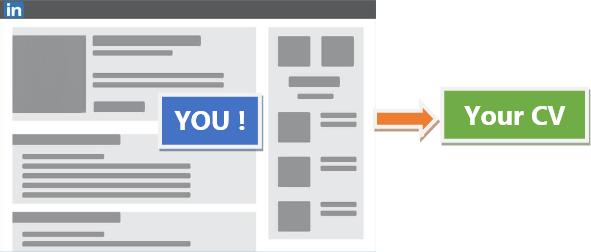
There is also a lot of information (and discussion) on the Internet, on how to make a good CV. Feel free to do “your way”, but try, as far as possible, to be very straight and clear always.
A good tip is to think of it the following way: if you are the interviewer, what would you like to see on the CVs if you had to analyze and choose one among a group of several people?
You need to be direct and inform only the basic/important, and in a well-balanced way. If you’ve participated in 1, 000 trainings, you don’t have to list them all, do you?
I really like my CV – and it’s automatically generated by LinkedIn itself. ![]()
https://www.linkedin.com/in/leopedrini/
A 2-page PDF file with clear information about me – and what an eventual contractor would like to see.
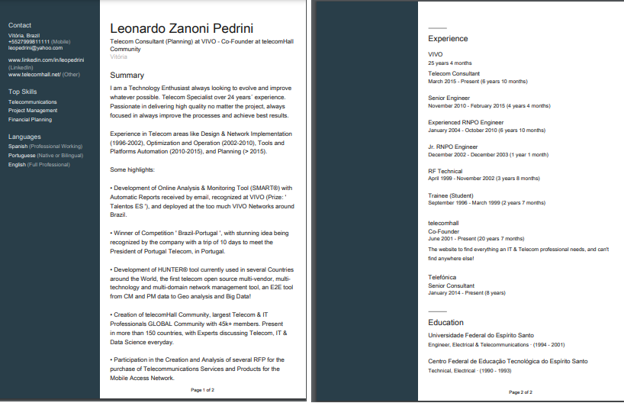
You can export any LinkedIn profile to PDF. To do this, visit the desired profile, then click “More” (1) and then “Save to PDF” (2).
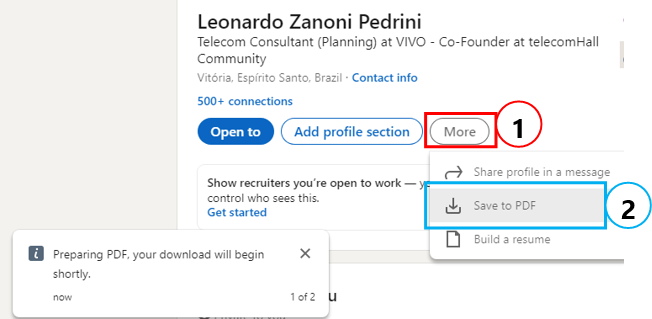
Tip: The PDF generated by LinkedIn is pretty cool, but if you want to make any changes, you can do what I did: Export to PDF format and then open in Microsoft Word (yes, Word opens PDF files) - and do any extra editing that you want - and finally save again as PDF. ![]()
Ask for recommendation?
Continuing and talking a little about Recommendations.
Yes, a recommendation “from the right person” can make a difference in a hire. But the general rule is that it should not be your focus (to get many recommendations). Especially if it’s not from people who really know you – and recognize your work to the point of public praise (recommendation).
The summary is: it’s no use shooting everywhere, asking everyone for a recommendation. The important thing is the “quality” of the recommendations, not the “quantity” (only recommendations from the right people make a difference).
Note: Since I have tens of thousands of followers on LinkedIn, I have long chosen not to give recommendation to anyone - on the principle of isonomy and not make recommendations from people I barely knew – and who asked me for a recommendation, okay?
Can I send you my CV?
No. Especially if you do not know (and very) the person, asking if you can send your CV is very annoying.
It gives you an idea that you’re passing the responsibility of going after a job for him, or that you’re “shooting everywhere”.

Unfortunately, no one’s going to take your CV and go out asking for a job for you. What you’re going to get, for sure, is just an embarrassment on the part of the person – and he’ll still tell you that he “sent it internally”– even if he may not have done it. ![]()
Of course, there are exceptions – but the general rule (and tip) is: only send CV if someone asks you. Or when you apply for a job that asks for the submission.
Nothing but the truth
Depending on the opening you are looking for you can make “adjustments” to your CV (or LinkedIn Profile), highlighting the information that shows that you should be hired. ![]()
But be careful: as tempting as it is to write on our CV exactly what the job is asking for, do it only if it’s true! Don’t enter information on your CV that you don’t have full confidence you can demonstrate.

Imagine, for example, that you are looking for a spot on a soccer team. And writes so many “skills” on your CV that it reaches PSG (Paris Saint-Germain).
Keep imagining it, and suppose you did the interview, and you was hired! Perfect, isn’t it?
Well, on your scheduled debut day, Neymar gets hurt, and they decide that you will play the final along with Mbappe instead of Messi. So, can you demonstrate in practice what you wrote on your CV? ![]()
The tip is: always tell the truth!
Note: here the tip is worth not only to the information of your CV but to everything in your whole life. Telling the truth is always one of those qualities that define a person’s character. And at that point there’s nothing to discuss, right? ![]()
English is not an option
The English language is not an option if you want to stand out. You need to know English, otherwise you’ll be limited.

Imagine, for example, if the German Rock band Scorpions sang songs in German instead of English.
Do you think they would have the same success?
Or if they sang it all in so bad/wrong that hardly could be understood…
Likewise, if you do not know or improve yourself in the English language, you can even achieve a relative success, but it will be “limited”!
Also, when you inform your language skills on your CV, be as faithful as possible to your level. Because “no” – you will “not” learn English (or other language) overnight, in a magical course of a few weeks!
Don’t write what’s not true on the CV, don’t try to fool anyone, not even yourself.
In this case the tip is: learn English (if not your native speaker). And always try to improve it!
You don’t “need” a job!
There is a big difference between saying that you “look for” a (new) job or that you “need” a job.
Whenever you contact someone about a job, always tell that you are “looking for”, and not that you “need it”. This gives you the idea that you want to grow, want to evolve – rather than looking like something like a favor or even “alms” in some cases.

The tip is: inform everyone that you “look for” a (new) job.
Don’t despair!
And even if you really need a job, don’t despair – or at least never let people see you’re desperate! ![]()
It may be that in your life the bills are delayed - with banks charging you. You may be having trouble maintaining your family’s well-being – and even go through moments of lack of partnership with your partner. And another series of obstacles and challenges that life can present to you.
Maybe you’d think the search for a job would look like this:

When in fact it can be like this:

But that’s okay.
What matters is that in the end it be like this:

So: never give up. Aim at your dream, your goal and stay strong on it.
I really like a movie that tells the real story of Chris Paul Gardner, currently one of the richest men in the United States.
Don’t think it was easy to get to where he came from. He’s been through a deep moment of deprivation and dismay – and only those who have ever been through something like this ever know what it’s like.
Now a spoiler: in suffering he finds the meaning of life, and besides all obstacles he moves on - he renews itself and finds his space! Even with the spoiler, it is worth seeing the Movie and learning that motivation can arise from need, bringing a great sense of responsibility.
Then again: don’t give up on your dream!
You will get your ideal job, which through your work will allow you to feel productive and active. And of course, compensated for that.
Imagine yourself in the scene of the film in which Chris Gardner (Will Smith), finally, gets the job that he sought so much, dedicating himself, going through difficulties, having nowhere to live and having to take care of his little son. You’re going to make it, too. ![]()
If you really want to realize a dream, you have everything to do it – you just need to have determination, courage, daring and also faith (why not?).
Where are there jobs?
So far, we’ve seen some tips, but nothing out of the ordinary.
Now yes, let’s go to what matters: Find where the openings are!
One option is to enter multiple job sites and do a search on each of them. But there are so many sites that the task may ends up not being easy. ![]()
Each country has its most famous or most used job sites by companies looking for good professionals in the market. If we listed some of them here, for each country, the tutorial would be giant – telecomHall is present in every country in the World.
So: let’s leave this as a “to do” - a new topic here in our Forum, deal?
The tip here is: sign up for the main job sites, and also for the companies where you want to work.
And you don’t have to wait for the next tutorial. You can go ahead and do a Google search, about the best sites to find a job in your country. (This way when our list is released you can add / comment if any missing from the list). ![]()
Automatic Job Search Engine
Another option, besides job sites, is to use general Jobs Search Engines such as Google Jobs. https://careers.google.com/jobs/results/
It also works - and you also find jobs!
The detail of generic search engines is that they gather jobs from several other job sites. So your task to find jobs gets a little easier.
But there’s also the other side – you’re totally relying on the updates from these search engines:
- How often do they update jobs offers?
- What job sites do they gather information from etc.
And this “dependency” also happens with job-specific sites: - What companies add new jobs there? (Does all companies do it?)
- What job sites should I search? (Where can I find this updated list?)
To make it worse, there are companies that (still) do not disclose their jobs anywhere besides their own website. Fortunately, they are few – and more and more companies are looking for good professionals online.
But there are still a few cases of jobs that are disclosed as “little” (or as hidden) as possible – for reasons that are not worth discussing here. In the past this was much more common, but nowadays it is very rare (but unfortunately, it can happen). ![]()
Well, there’s nothing that can be done about jobs that aren’t disclosed.
But there is much that can be done in relation to the jobs that are there, somewhere, waiting for you! ![]()
The tip in this case is: the same way you registered and searched for jobs on the main jobs sites in your country, register and search using generic search engines.
But fasten your seat belt, we’re just getting started. ![]()
Do I have to pay?
If you are looking for a job it is very likely that you are unemployed and/or in need of money. (In some cases people seek new job even when employed – and in this case the issue of payment is less complicated).
Unfortunately not all sites offer free service (at least for you).

But some sites end up being “subsidized” by companies - which pay to advertise jobs - so the charging don’t go for the candidates.
Other sites offer a free basic service, and charge for a more “premium” service.
I cannot tell how much paid services can help you. But I believe yes, they do help a little. But I also believe that you can find a (new) job yourself without having to pay anything to anyone!
And exactly because of this belief I wrote this article, like I said at the beginning.
Getting a job is like following a recipe with multiple “ingredients”. The more spices you put on, the tastier the result gets.
And in our case, the ingredients are:
- Have a good resume (or CV): your business card.
- Have a good network of contacts: friends and colleagues to count on.
- Have availability: and register on jobs websites and job search websites.
- Be lucky: be in the right place at the right time. (In this case there is nothing we can do right?)
- Have skills: that meet the requirements of the desired job. (Here there is always what to do – always evolve, we will see in a little soon).
- Find the jobs: that you are looking for.
- Don’t give up.
By mixing the “ingredients” above, surely you will be successful.
But like every good recipe, there’s always a “secret ingredient”.
And in our recipe, the secret ingredient is what you’ll know now: LinkedIn Jobs!
LinkedIn Jobs
As the name says, LinkedIn Jobs is LinkedIn’s Jobs platform.

LinkedIn is certainly the World’s largest professional network, with more than 750 million users around the world – and counting ![]() . It is also known as Professional Social Network.
. It is also known as Professional Social Network.
And LinkedIn (whether the Professional Network itself or the LinkedIn Jobs Platform) is one of the best resources you can use to get a job.
For example, when someone in your network share a new job offer (via a post in his feed) or by the platform itself (LinkedIn Jobs).
When jobs are shared by your network of contacts, you have the option to contact the person who posted, ask for more information, etc.
The big problem is that in this case you depend on someone posting a job. That is, you can’t do anything but wait. ![]()
And what you should do then? Go after the Jobs!
And there’s a great way to achieve that, let’s see in more detail now.
Jobs, Big Data & Automation!
We live in a very different World from a few years ago. We’re in the 5G era and we’re talking about 6G already. Machines already do the fastest and best tasks, with Machine Learning and Artificial Intelligence. With everything connected, in the Internet of Things.
And all this in a large, interconnected cloud, the so-called Big Data. So why not take advantage of it?
If all the information is in one place, we can “query” that place, and find out where are the jobs that best suit our profile! ![]()
And the best way to do that (to demonstrate) is through examples – as I always do in our community in the technical articles I write.
Today’s demonstration will be a little different – it won’t be with analogies, it’s about real cases. (Of course, I will not publish the names of those involved, ever).
Last week, in one of my WhatsApp Jobs groups, one person asked the following question:

“Any open positions in Germany for RF Optimization Engineer?”
telecomHall Jobs groups are different from Technical Discussion groups – they are just for sending Jobs offers and nothing more; even so, some people insist on “asking” for openings (open positions).
This time, instead of informing the member that that group did not have this purpose (to allow members to “ask” for jobs), I decided to use it as an example.
And I posted to the member - and to the group - several links of RF Optimization Engineer in Germany! (Exactly what he had asked for).
And how did I do that?
There’s no secret: I went to LinkedIn Jobs, and I typed what I was looking for.
Note: If you are going to follow the same steps shown here, I recommend using Browser and not via Mobile.
To do the same, visit LinkedIn, and then click Jobs (1).

Now type what you are looking for (1) and also “where” do you want (2). In my example, it was “RF Optimization Engineer” and “Germany”.

And that’s it! By clicking the “Search” button you will see a list of jobs exactly like the one you searched for. You can then click on each of them on the left side (1), and see how long the job has been posted, how many people have applied etc. On the right side (2) you can read all the details of each of the selected job.
And you can apply for the job by clicking the “Apply” button (3).
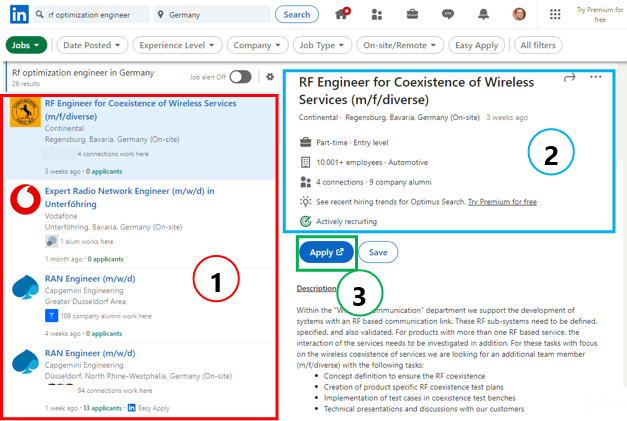
Just to demonstrate in the Jobs group (where I was asked for positions of RF Optimization Engineer in Germany) I sent these jobs, one by one.
Openings (jobs) in several large companies such as Vodafone, T-Mobile, Qualcomm. And also in smaller companies – but no less important, especially if your job is there, don’t you agree? ![]()
But you may be still having some questions:
- I didn’t see anything too much here… you just did a search…
- But LinkedIn doesn’t have all the existing jobs, it’s very limited…
On the first question: yes, I just did a search, but maybe someone had never done it – and didn’t know that doing it was that easy. ![]()
And on the question of being few jobs offers… that’s not true anymore.
It may even be that at first, when LinkedIn wasn’t recognized as the world’s largest professional community, there weren’t many options. But currently I assure you that hardly a job is not “also” on LinkedIn.
That’s because the companies that post jobs offers in different locations have one thing in common – they post “also” on LinkedIn. That’s right – you’ll find on LinkedIn the same job that a company has added on its own job site, for example.
And many of these jobs – when you click the “Apply” button - lead straight to the websites of the contracting companies themselves or services they have outsourced to.
In short: the only common place that nearly 100% of today’s companies advertise Jobs is LinkedIn. So just search on it – and follow up with the links to each specific link.
In some cases, companies are already well “integrated” with LinkedIn, presented the “Easy Apply” button instead of the “Apply” button.

In this case, by clicking the button your LinkedIn profile information will be automatically sent to the job.
Note: Depending on the Company and its integration with LinkedIn, it takes direct data from your profile or allows you to additionally upload a CV.
I believe you’ve come up with the idea. But let’s keep going… because it gets better! ![]()
Making the jobs come to you!
We just saw that we can find any job opening we want (and wherever we want) through LinkedIn Jobs.
But we can’t keep accessing it all the time, doing searches (and more searches). We end up being inefficient – and no one has time for it.
Remember that I mentioned earlier about the use of Big Data for “look for the jobs”. But now we’re going to use “Automation” and make sure that what we want gets to us. And for that, let’s create Alerts!
Every time a new job becomes available on LinkedIn it will reach your email – and you’ll be able to see an opportunity that might not even come to your attention otherwise! ![]()
Creating an alert on LinkedIn Jobs is very simple.
Every time you do a certain search (1) the “Job alert Off” button (2) appears.
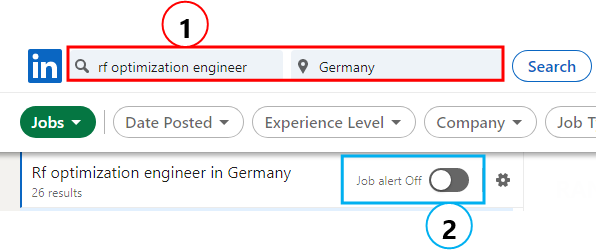
You can click this button changing to “Job alert On” (1) – that is, you have created your LinkedIn Job alert for this specific search.

In the lower left corner appears a message, stating that the alert has been created and also giving the option of “Manage Alerts”.

If you click the “Manage alerts” link you will be able to see your configured alerts (1).
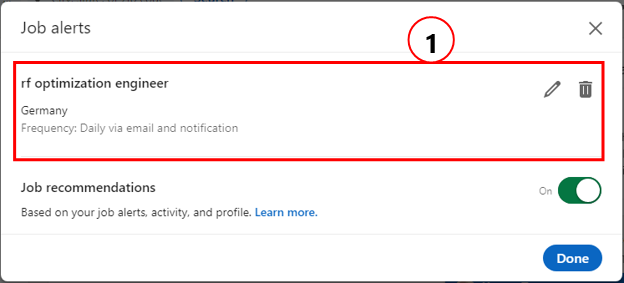
If you want to delete the alert, click the “Trash” icon. ![]()
And if you want to edit the alert, click the “Pencil” icon. ![]()
And you can choose whether you want to receive the alert - daily or weekly; by email and/or by notification from LinkedIn itself.
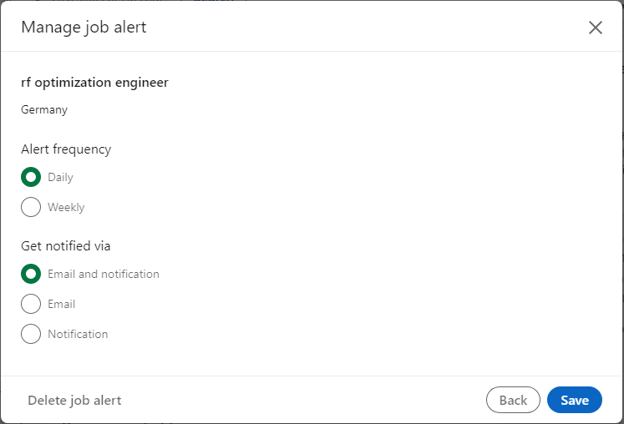
Each time you create an alert, you’ll receive an email that your alert has been created.
![]()
And from this moment on, whenever a new job is added to LinkedIn you will receive an alert in your email! Nice, isn’t it? ![]()
But let’s continue, and now imagine that you do not seek jobs in only one country – but in several! For example, be open to working at “Huawei” in any “Middle East” country.
You already know what to do: create your alert as below. Type “Huawei” in the search field (1), and “Middle East” in the location field (2). And click the alert button (3) to activate this alert. Note: See that at the time of this search we have 133 jobs to work at Huawei in the Middle East! (4) ![]()
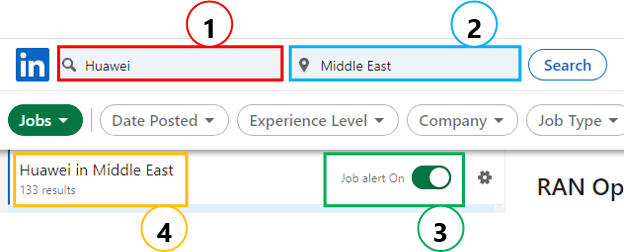
If you click on the gear (next to the enable alert button) you can see that we now have 2 alerts set up.
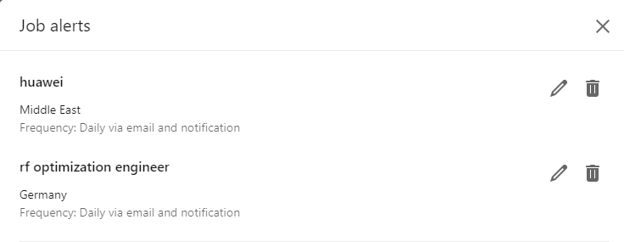
When you set up an alert, an email arrives stating that the alert has been created – and it arrives with the main jobs that meet the search criteria.
And then you’ll continue to receive daily (or weekly) in your inbox an email informing you of new jobs (when new jobs are added, of course).

And now, to finish with LinkedIn’s job alert tips, let’s assume you want to work “remotely” in the telecom area and “anywhere in the world.” Yes, you can search for these kind of Jobs, and even create alerts like this!

See that in the moment of this search there were more than 200 jobs available (1)!
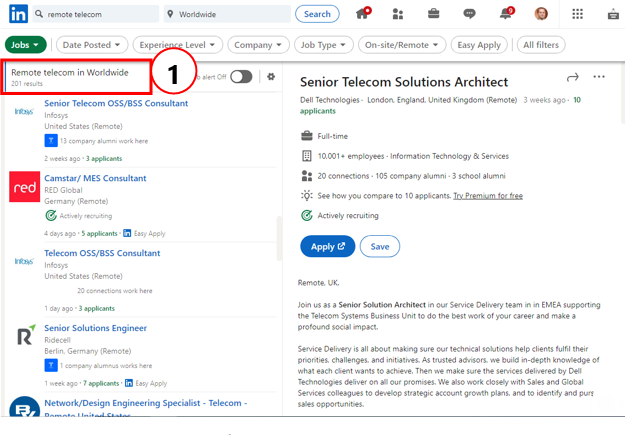
Also a nice tip, isn’t it? ![]()
But let’s continue with some more interesting information.
Jobs Suggestions (recommended)
In addition to Jobs Alerts, you have the option to turn On/Off job alerts based on your profile (1) - which is why it’s so important to keep your LinkedIn Profile (your CV) up to date!
To do this, simply click the On/Off button (2).
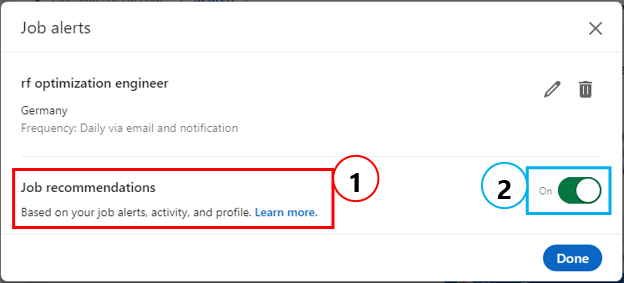
And what does that mean? That in your LinkedIn feed, from time to time you will find jobs “suggestions” or recommendations based on your profile, your searches etc.
Like these that I get, as below.
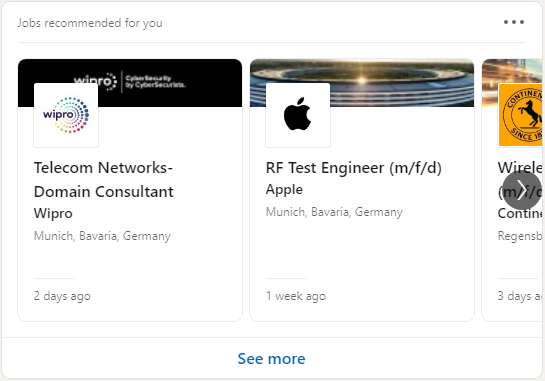
As you can see, the jobs will come to you – even without you going after them (you didn’t have to search/filter)! ![]()
Jobs in your network
In addition to the jobs that will come to you, or that you can search for using LinkedIn Jobs filters, there’s another way to find jobs: the topics created by the members of your network, which naturally shows in your Feed.
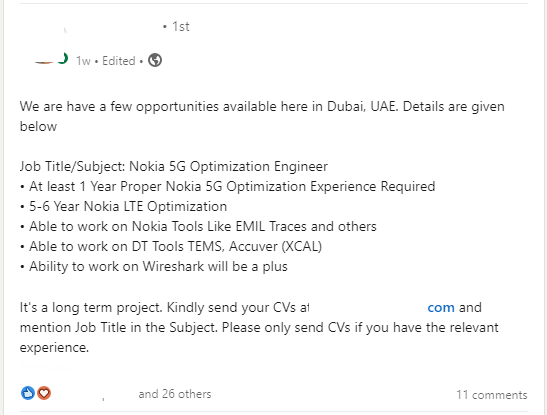
Usually these jobs are advertised by HR professionals, but can be shared by anyone – even you can advertise a Job in your feed (why not?).
They usually have the title and description of the job, and the location. And most of the time you have an email to where your CV should be sent.
But don’t worry – you don’t have to go out connecting to all HR professionals - just need someone in your network interacts with the post (comment, like, share) so you know about it. ![]() (Some people use to comment something like “To wider reach of job offer”).
(Some people use to comment something like “To wider reach of job offer”).
Can I post a job?
In addition to the search and alert management options we’ve seen, LinkedIn Jobs has several other options (1) that will help you find your spot. Plus, you can also Post a free job! (2)
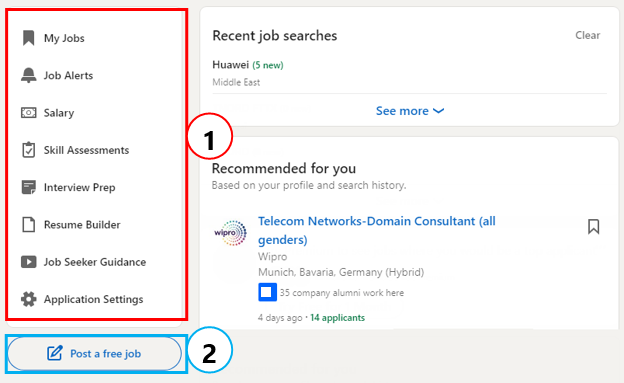
In the same way that LinkedIn is the most suitable place for those looking for a job, also an excellent place for those who offer a job - who has a job and seeks the best professional to fill it.
That is, we join the useful to the pleasant: if you use LinkedIn you can either find a job, as well as to post one.
If you have a Job offer, LinkedIn can help you find the right candidate. Especially if you describe the job well, using the right keywords. One single detail (requirement) is that your company – that is offering the job - must have a Company Page on LinkedIn for the ad to be published successfully.
Tip: In a job listing, you can add up to 10 keywords related to the job. This is one of the filters linkedin used to find the most suitable candidates - and therefore also serves as a tip - always keep your profile up to date, with the most relevant keywords (skills) in your CV. This increases the chances of a match between the jobs offered and those that will be suggested to you. ![]()
LinkedIn is not Facebook!
That’s right, LinkedIn is not Facebook, nor Twitter, nor Reddit or any or Social Network. LinkedIn is a professional network - and never forget that!
So issues like Politics, Religion, Sports etc. are out of the question (don’t even think about it)!
Remember that LinkedIn is your CV. And you don’t want a post with you defending your “best” politician to become your calling card, will you?
So the tip is: just post what your boss (or future boss) would like to see in your team (technical issues, professional growth topics, job sharing, etc.).
You always need to evolve
Now we have a very important information: It’s no use following anything you saw here today if you don’t have the minimum and necessary requirements for the job you want.
It’s no use applying for an Engineer position if you graduated in Medicine. Or want to be an airplane Pilot if you are afraid of heights.
You need to always try to evolve. And never give up.
In 1989, I lived in Aracruz - a small town in the countryside the State of Espírito Santo, Brazil. That same year, I risked taking a test to join a renowned school in the State Capital, Vitória.
I got accepted – competing with people from all over the State and even the Country (Brazil). The dispute was really hard – it was one of the best schools in Brazil (Federal Technical School of Espírito Santo) – and also free! ![]()
I moved to Victoria, to my aunt’s house. Even with all the affection of the family, the distance from home and mother/father and so much news for a boy from the countryside made me “decide to give up everything”. Yes, I decided to abandon, and return to my home town, my parents, my comfort zone!
Last night in Vitória, before I went to sleep, I took a magazine from my cousin, and started reading – it was a Surf magazine. And fortunately, that’s when the change happened in my life. A phrase, from a surfer, made me reverse the whole situation, from that moment to today:
“Find out where the limits are… and start from there!”
I was inspired by the phrase of that surfer who was poor when a child and became World champion – because he followed that phrase.
And that’s what I did too! I was at my limit – but I realized I needed to keep going, face all the fears and challenges of that time.
To sum up: I decided to stay and evolve! And this has changed my whole life, my whole future. I went to the Technical School, and from there I went straight to the Federal University of Espírito Santo, in the course of Electrical Engineering. In 1996 I got an internship at ES State Telecommunications Company (TELEST) – where I follow till this day (the company changed its name, was privatized – but it remains the same).
Instead of a student in the countryside city I became an experienced Telecommunications Consultant in one of the Biggest Telecommunications Companies of the World!
But this whole story was just to tell you that: everything is possible! But also, for sure, certain difficulties will come and you need to be prepared, have willpower, and not let discouragement or limits prevent your professional success! ![]()
Groups
Discussion groups are an excellent way to grow professionally (increase your skills) and also to find (or share) jobs.
The groups bring together several professionals from the same area of activity – in the case of our community, Telecom and IT. And all professionals have the objective of networking, seeking new knowledge or exchanging experiences.
So groups can be a great way to find jobs and increase knowledge. Some LinkedIn groups, for example, have specific “LinkedIn Jobs” tabs – companies and people can post jobs there for free and assertively – the group’s professionals are within the desired niche. So jobseekers have one more source.
For increased knowledge / updates in Telecommunications area you can find many groups. Search for groups that are most in line with your interest.
Here you can see telecomHall Groups in WhatsApp: WhatsApp/Telegram - telecomHall Groups
But we also have Discussion Groups in several other places such as:
- Linkedin Group: Sign Up | LinkedIn
- Facebook Page: telecomhall
- Twitter: https://twitter.com/telecomhall/
And of course: try to participate, or at least read posts regularly. It’s not just because you joined a group that the job is over. Quite the contrary it is only beginning – and the more you participate, the more chance you will have to evolve – both in knowledge and networking and in hiring.
FORUMS
Groups in general work! Especially if the group is well focused on its area of expertise. You’ll find people like you there, and that’s very good.
But without a doubt, the best source of information you’ll find is in Specialized Forums.
In Programming, one of the best Forums is the Stack Exchange https://stackexchange.com/.
If you’re a programmer, you’ve certainly done a Google search for a code snippet, and you’ve found it in a Stack Exchange topic.
And of course, when the topic is Telecommunications and IT, there is no doubt that the best Forum is ours: https://www.telecomhall.net/.
Our community brings together the best Telecom professionals in the World, from all countries. Just as developers find everything they need in Stack Exchange, you from Telecommunications or IT will surely find everything you need in telecomHall.
Do the test yourself: search for any keyword – and see how many discussions are there! You can join an existing discussion, or if you don’t find what you’re looking for, start a new topic. You’ll be amazed by this fantastic new form of interactive learning!
In addition to groups and forums, you can and should explore any and all resources you have at your fingertips to upgrade, improve your skills, or even learn a new one. This includes watching videos, reading books, taking courses, etc.
But I believe the goal here today has been demonstrated, so we can conclude.
Interview
Following the tips above, you have many chances to be called for an Interview. Unfortunately, this our tutorial here today is already very extensive, and we really need to conclude - we can’t extend with interview tips.
But for members of our community, the tip is: actively join the community (in our case, telecomHall). It is without a doubt the best place where you will find all the help you need to update yourself and/or evolve professionally – if you do, you will be up to date and prepared for any interview! All this without having to pay anything, remember that. ![]()
If you have any specific questions, start a new topic – tens of thousands of Telecom and IT professionals will see your question, and most likely get your answer/explanation.
Tip: Before starting a new topic, it is highly recommended that you do a “Search” in the Forum. See an example for “throughput”:
https://www.telecomhall.net/search?q=throughput
As I said: you will be surprised by the large number of professional discussions that have occurred in all these years in the Forum. ![]()
Conclusion
Today we saw a different tutorial: how to get a job!
Although the focus has been our community (Telecommunications and IT), the tutorial brings excellent tips that can be leveraged by anyone in any area and anywhere in the World.
Without running the risk of being ambitious the tutorial really fulfills what it promises - if all the tips presented are followed the chances of getting a job are very high! ![]()
I wish I could give individual attention to all members of the Community, but unfortunately (or fortunately) we’ve passed 40,000 members – and it’s very difficult as much as I try.
There are so many tips presented that you can’t even make a summary here – or that conclusion would be too big.
But if you have questions, read the tutorial again.
And if you know people who look for a (new) job, don’t forget to send them this article – sharing experience and tips that can change the life that those who need.
I’m not going to extend myself anymore – that’s what it is for today.
But be sure to continue here, evolving in our largest telecommunications community in the world – thanks, among others to you as member! ![]()
